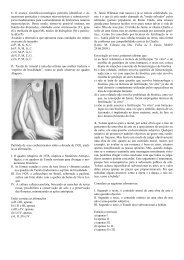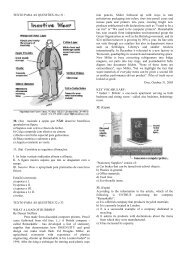Prova de Português 1, Português 2 e Inglês - Colégio Santa Clara
Prova de Português 1, Português 2 e Inglês - Colégio Santa Clara
Prova de Português 1, Português 2 e Inglês - Colégio Santa Clara
You also want an ePaper? Increase the reach of your titles
YUMPU automatically turns print PDFs into web optimized ePapers that Google loves.
Why Bilinguals Are Smarter<br />
Speaking two languages 5 rather than just one has obvious<br />
practical benefits in an increasingly globalized world. But in<br />
recent years, scientists have begun to show that 10 the<br />
advantages of bilingualism are even more fundamental than<br />
being able to converse with 11 a wi<strong>de</strong>r range of people. Being<br />
bilingual, it turns out, makes you smarter. It can have a<br />
profound effect on your brain, improving cognitive skills not<br />
related to language and even protecting from <strong>de</strong>mentia in old<br />
age.<br />
This view of bilingualism is 1 remarkably different from 12 the<br />
un<strong>de</strong>rstanding of bilingualism through much of the 20th<br />
century. Researchers, educators and policy makers long<br />
consi<strong>de</strong>red a second language to be an interference, cognitively<br />
speaking, that <strong>de</strong>layed a child’s aca<strong>de</strong>mic and intellectual<br />
<strong>de</strong>velopment. They were not wrong about the interference:<br />
there is ample evi<strong>de</strong>nce that in a bilingual’s brain both<br />
language systems are active even when he is using only one<br />
language, thus creating situations in which one system<br />
obstructs the other. But this interference, researchers are<br />
finding out, isn’t so much a handicap as a blessing in disguise.<br />
It forces the brain to resolve internal conflict, giving the mind a<br />
workout that strengthens its cognitive muscles.<br />
Bilinguals, 2 for instance, seem to be more a<strong>de</strong>pt than<br />
monolinguals at solving certain kinds of mental puzzles. In a<br />
2004 study by the psychologists Ellen Bialystok and Michelle<br />
Martin-Rhee, bilingual and monolingual preschoolers were<br />
asked to sort blue circles and red squares presented on a<br />
computer screen into two digital bins — one marked with a<br />
blue square and the other marked with a red circle. In the first<br />
task, the children had to sort the shapes by color, placing blue<br />
circles in the bin marked with the blue square and red squares<br />
in the bin marked with the red circle. Both groups did this with<br />
comparable ease. Next, the children were asked to sort by<br />
shape, which was more challenging because it required placing<br />
the images in a bin marked with a conflicting color. 13 The<br />
bilinguals were quicker at performing this task.<br />
6 The collective evi<strong>de</strong>nce from a number of such studies<br />
suggests that the bilingual experience improves the brain’s 3socalled<br />
executive function — a command system that directs the<br />
attention processes that we use for planning, solving problems<br />
and performing various other mentally <strong>de</strong>manding tasks. These<br />
processes inclu<strong>de</strong> ignoring distractions to stay focused,<br />
switching attention willfully from one thing to another and<br />
holding information in mind — like remembering a sequence<br />
of directions while driving.<br />
14 Why does the fight between two simultaneously active<br />
language systems improve these aspects of cognition? Until<br />
recently, researchers thought 7 the bilingual advantage was<br />
centered primarily in an ability for inhibition that was<br />
improved by the exercise of suppressing one language system:<br />
this suppression, it was thought, would help train the bilingual<br />
mind to ignore distractions in other contexts. But that<br />
explanation increasingly appears to be ina<strong>de</strong>quate, since<br />
studies have shown that bilinguals perform better than<br />
monolinguals 4 even at tasks that do not require inhibition, like<br />
threading a line through an ascending series of numbers<br />
scattered randomly on a page.<br />
The bilingual experience appears to influence the brain from<br />
infancy to old age (and 8 there is reason to believe that it may<br />
also apply to those who learn a second language later in life).<br />
In a 2009 study led by Agnes Kovacs of the International<br />
School for Advanced Studies in Trieste, Italy, 7-month-old<br />
babies exposed to two languages from birth were compared<br />
with peers raised with one language. In an initial set of tests,<br />
the infants were presented with an audio stimulus and then<br />
shown a puppet on one si<strong>de</strong> of a screen. Both infant groups<br />
learned to look at that si<strong>de</strong> of the screen in anticipation of the<br />
puppet. But in a later set of tests, when the puppet began<br />
appearing on the opposite si<strong>de</strong> of the screen, the babies<br />
exposed to a bilingual environment quickly learned to switch<br />
their anticipatory gaze in the new direction while the other<br />
babies did not.<br />
Bilingualism’s effects also extend into the twilight years. In a<br />
recent study of 44 el<strong>de</strong>rly Spanish-English bilinguals, scientists<br />
led by the neuropsychologist Tamar Gollan of the University<br />
of California, San Diego, found that individuals with a higher<br />
<strong>de</strong>gree of bilingualism — measured through a comparative<br />
evaluation of proficiency in each language — were more<br />
resistant than others to the beginning of <strong>de</strong>mentia and other<br />
symptoms of Alzheimer’s disease: the higher the <strong>de</strong>gree of<br />
bilingualism, the later the age of occurrence.<br />
Nobody ever doubted the power of language. 9 But who would<br />
have imagined that the words we hear and the sentences we<br />
speak might be leaving such a <strong>de</strong>ep imprint?<br />
Adapted from<br />
http://www.nytimes.com/2012/03/18/opinion/sunday/thebenefitsof-bilingualism.html<br />
64. The psychological study done in 2004 (3rd paragraph)<br />
showed that<br />
a) the children in preschool had the same performances in both<br />
tests.<br />
b) bilingual children were more efficient in the most complex<br />
test.<br />
c) monolinguals are better at solving mental puzzles.<br />
d) blue and red are confusing colors for both groups.<br />
65. The last two sentences of the second paragraph mean that<br />
the interference of bilingualism<br />
a) was consi<strong>de</strong>red positive in the past, but nowadays this view<br />
has changed.<br />
b) has always been a problem, since the brain has to solve an<br />
internal conflict.<br />
c) brings to the brain an internal conflict that improves its<br />
cognition.<br />
d) has proved to increase the disabilities of the brain and<br />
reduce the blessings it can have.<br />
66. Mark the INCORRECT option. According to the text,<br />
recent researches prove that bilingualism<br />
a) causes general cognitive <strong>de</strong>velopment.<br />
b) enables people to communicate better in both languages<br />
only.<br />
c) prevents people from suffering from problems related to<br />
memory and other mental disor<strong>de</strong>rs or <strong>de</strong>lay these problems.<br />
d) is seen as positive cognitive interference.<br />
67. Based on the text, it is NOT correct to state that<br />
bilingualism<br />
a) <strong>de</strong>lays the symptoms of diseases related to old age.<br />
b) has effect on children’s brains.<br />
c) <strong>de</strong>velops the ability of performing difficult tasks.<br />
d) is irrelevant for the el<strong>de</strong>rly.





